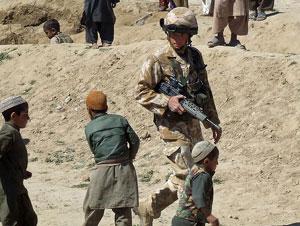Changing U.S. strategy in Afghanistan
(Image: Angelfire_3182, Creative Commons)
The following is not a full transcript; for full story, listen to audio.
Why are we in Afghanistan? To destroy the Al-Qaeda? To make sure the Taliban doesn’t get back in power? Both? What is the economic impact of the war on the US economy? And, just what would victory in Afghanistan look like anyway? On "To the Best of Our Knowledge," the question of Afghanistan. The Obama Administration’s refocusing the US military. But after years of war in Iraq, after Abu Grabib, after WMDs … does the US still have the moral authority to conduct nation building?
U.S. troops invaded Afghanistan after the terrorist attacks on September 11th, 2001. In less than three months, the Taliban, which ruled Afghanistan, and offered safe haven to Al Qaeda, were ousted. And, a U.S.-backed administration, backed by Hamid Karzai was put in place in Kabul. Fast forward to today, in 2009. The U.S. is still fighting the Taliban. Al Qaeda operatives are still plotting from Afghanistan, and the fear that many had before the 2001 invasion has come true: the war in Afghanistan has destabilized a nuclear power in Pakistan. So what happened?
Pakistani journalist Ahmed Rashid is the author of "Descent into Chaos: The US and the Disaster in Pakistan, Afghanistan, and Central Asia." Rashid acted as an advisor to Richard Holbrooke, President Obama’s special envoy to the region, and explains that the U.S. rushed into Afghanistan after 9/11 in search of Al-Qaeda, but was never interested in the country’s real problems. He feels the Obama administration has a different attitude.
"The U.S. was never interested in long term solutions to the problem of Afghanistan. "The Bush administration was not actually interested in Afghanistan, or rebuilding it, or properly dealing with Pakistan and the Taliban. They wanted to move on to Iraq, and literally, within weeks of winning the war in 2001, the few American troops that were in Afghanistan, the Special Forces, they were pulled out, and they began training for Iraq. So, Afghanistan was never really on the agenda for the administration — settling it, rebuilding it, giving the Afghans a chance. The rhetoric of the administration never matched what they did on the ground."
Rashid feels that the Obama administration has signaled a change in the strategies put in place under the Bush adminstration that led up to the current, unstable situation.
"There is a lot of change right now. On the wider front, President Obama shut down Guantanamo, he’s redefined the war on terror, that is not including all Muslim groups into one category like Bush had done, but separating Al Qaeda and separating the global jihadists from local nationalist groups, even though they may be extremist groups, but those who don’t have a long-term agenda.
"(President Obama) started a dialogue with Iran, he said he is willing to talk to the Taliban, and now his commitment to Afghanistan — I know a lot of the American media has emphasized the military component of this sending 21,000 more troops, sending trainers to train the Afghan army, and et cetera. But I think the key component is actually his promise and pledge to rebuild the country; there is a very large civilian part of the plan.
"Now, many of these items that he is going to do now were promised by the Bush administration seven or eight years ago. And now, of course, it is going to be much more difficult to do all of these things because you are doing it in the midst of an insurgency. The Taliban are on a roll, they have a lot of the population in the south and in the east of the county terrified, cowered, the population (are) unwilling to help, aid agencies and the Americans, at the moment, because they are so frightened of the Taliban.
"So, it is a difficult period, but at least, I think, the Obama team have got their act going, and they have a very serious commitment to Afghanistan," says Rashid.
Purchase Ahmed Rashid’s book, "Descent into Chaos: The U.S. and the Disaster in Pakistan, Afghanistan, and Central Asia"
"To the Best of Our Knowledge" is an audio magazine of ideas – two hours of smart, entertaining radio for people with curious minds.
